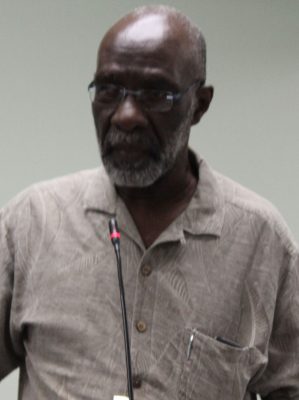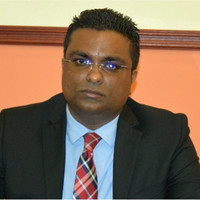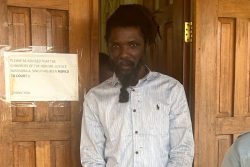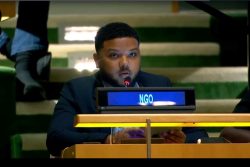Following a review of the recount process, the Guyana Elections Com-mission (GECOM) yesterday decided to approach the National COVID-19 Task Force (NCTF) for advice on increasing both the number of work stations and the working hours for the National Recount.
Currently the recount is being executed at 10 work stations from 08:00 to 19:00hrs, at the Arthur Chung Conference Centre (ACCC). It had been proposed that the entire process would be completed within 25 days but so far there has been an average of less than 50 ballot boxes recounted each day. At that rate the Commission would need twice as many days to process the 2,339 boxes generated at the March 2, 2020 elections.
Speaking with reporters last evening, Commissioners Sase Gunraj and Vincent Alexander explained that three options were being considered to increase the pace of the count.

“No substantive decision was taken on… ways and means of quickening the process [but] some procedural decisions [were made] to address the matter,” he said explaining that one decision was a further tour of the centre to see if there is space to establish more work stations.
Gunraj explained that the health team from the COVID-19 Taskforce will be invited to look at the facilities in the company of the commissioners today with a view of setting up between five to six more stations.
He explained that while he had initially proposed 20 workstations he no longer believes that such a number can be facilitated but an increase of six more stations will make it possible for more boxes to be counted simultaneously and reduce the overall time of the recount.
Another option posited was the extension of working hours. Alexander noted that the COVID-19 curfew is at six and the process is already being executed an hour beyond that time so the Commission must again approach the task force for advice.
He explained that since some staff are already working 12 hours and it might not be in the best interest of their welfare to have them work longer.
“Welfare cannot be ignored…they are already working in shifts,” he stressed.
The final decision taken by the Commission was to review the ballot box checklist so as to facilitate a more efficient processing of the boxes.
Currently the recount order provides that upon arrival of the ballot box at the workstation, it shall be first examined to ascertain that the seals are intact following which the contents shall be emptied, and the election materials examined.
“Notes shall be taken, and records made in accordance with the requirements of the Ballot Box Checklist [with] any observation not catered for in the checklist provided [being] recorded on the Observations Report Form,” the order explains.
According to Gunraj currently these processes are taking a significant amount of time.
“It takes almost 30 minutes to just open the box, open up the envelopes et cetera. The time taken to count is very short. It is a mechanical process and many of the work stations have developed a rhythm,” he explained stressing that some envelopes such as that which contains the folio are not germane to the recount.
Alexander noted that the review might see such envelopes which are in the ballot box but not critical to the recount process left unopened.
“Those are things that we are looking at reducing scrutiny of that will speed up the process. We also took a decision that not every ballot will be scanned. We are looking at reducing the documents that are increasing the burden time,” Gunraj stated.
Alexander further said that the Observation report will be used only to record anomalies and irregularities and exclude what can be referred to as a “compliance report” while Gunraj said that a counting quota is likely to be instituted.









